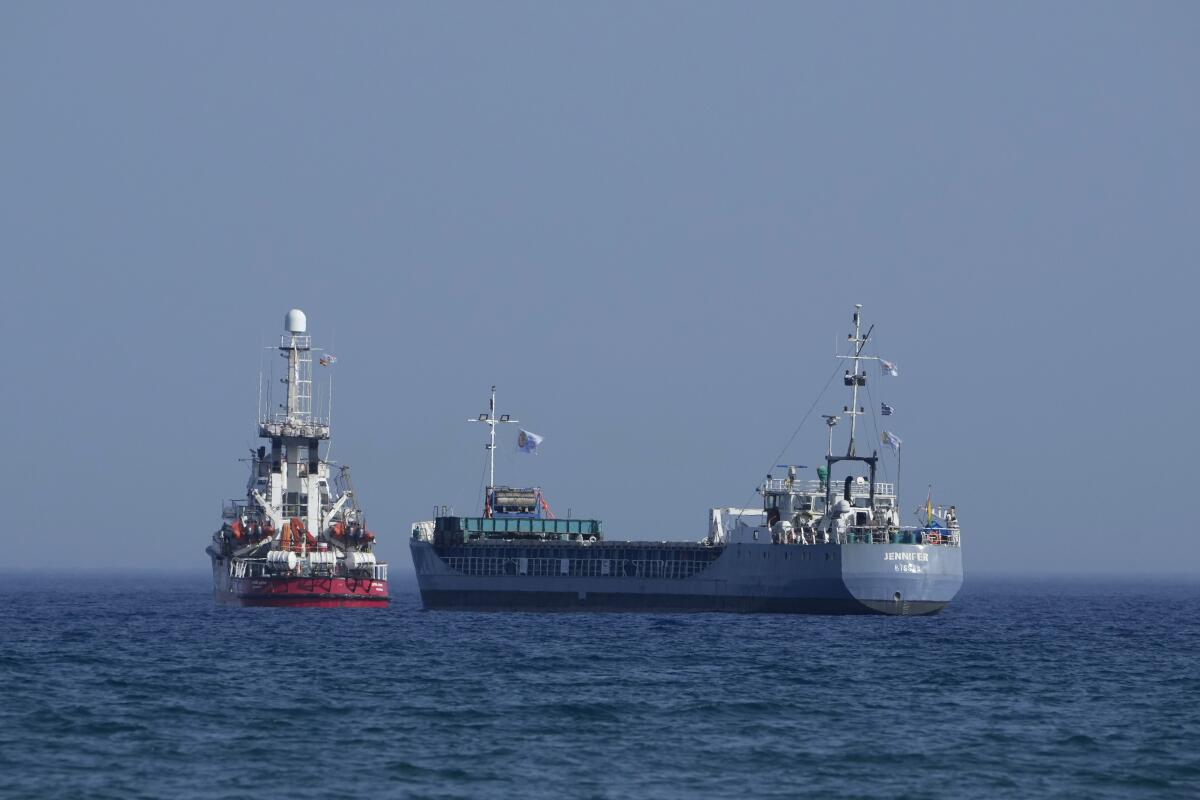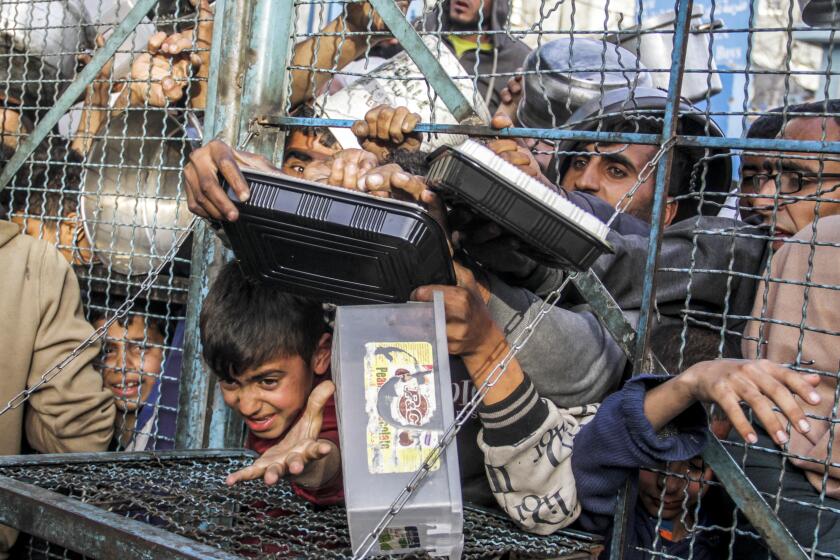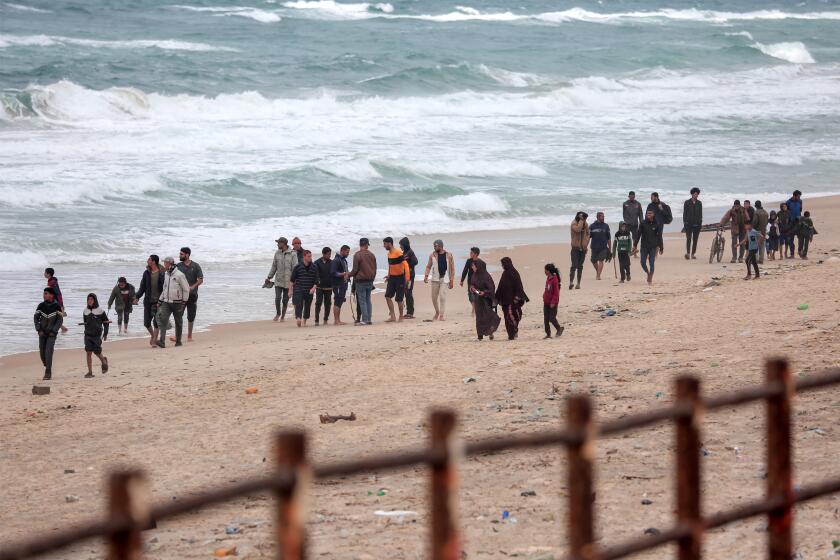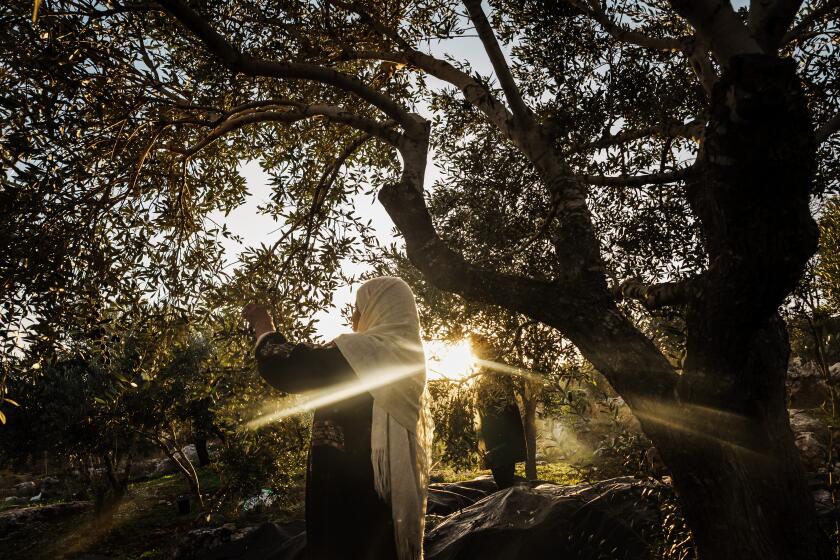Ships with a second round of aid for Gaza have departed Cyprus as concerns about hunger soar

- Share via
JERUSALEM — A three-ship convoy left a port in Cyprus on Saturday with 400 tons of food and other supplies for Gaza as concerns about hunger in the territory soar.
World Central Kitchen said the vessels and a barge were carrying ready-to-eat items like rice, pasta, flour, legumes, canned vegetables and proteins that were enough to prepare more than 1 million meals. Also on board were dates, which are traditionally eaten to break the daily fast during the holy month of Ramadan.
It was not clear when the ships would reach Gaza. An Open Arms ship inaugurated the direct sea route to the Palestinian territory earlier this month with 200 tons of food, water and other aid.
The United Nations and partners have warned that famine could occur in devastated, largely isolated northern Gaza as early as this month. Humanitarian officials say deliveries by sea and air are not enough and that Israel must allow far more aid by road. The top U.N. court has ordered Israel to open more land crossings and take other measures to address the humanitarian crisis.
Meanwhile, Egypt’s state-run Al Qahera TV said truce negotiations between Israel and Hamas will resume Sunday, citing an unnamed Egyptian security source. The channel has close ties to the country’s intelligence services.
Just one weeklong cease-fire has been achieved in the war that began after Hamas militants attacked across southern Israel on Oct. 7, killing about 1,200 people, mostly civilians, and taking about 250 others hostage. On Saturday, some Israelis again rallied to show frustration with Prime Minister Benjamin Netanyahu’s government and urge him to resign.
With warnings of ‘imminent’ famine in Gaza, there is a global push to get more aid to Palestinians amid the Israel-Hamas war. What are the roadblocks?
Families of hostages vowed to take to the streets across Israel. “Give the negotiations team a wide mandate and tell them, ‘Don’t come home without a deal, bring back our loved ones,’ ” said Raz Ben Ami, wife of hostage Ohad Ben Ami.
Nearly six months of war has destroyed critical infrastructure including hospitals, schools and homes as well as roads, sewage systems and the electrical grid. More than 80% of Gaza’s population of 2.3 million has been displaced, the U.N. and international aid agencies say.
In the coastal tent camp of Muwasi, mothers said they feared young children were losing memories of life before the war.
“We tell them to write and draw. They only draw a tank, a missile or planes,” said one mother, Wafaa Abu Samra. “We tell them to draw something beautiful, a rose or anything. They do not see these things.”
Children piled up for turns on a small slide twice the length of their bodies, landing in the sand.
Airstrikes and Israel’s ground offensive have left 32,705 Palestinians dead, local health authorities said Saturday, with 82 bodies taken to hospitals in the last 24 hours. Gaza’s Health Ministry doesn’t distinguish between civilians and combatants in its toll but has said the majority of those killed have been women and children.
Israel says more than one-third of the dead are militants, though it has not provided evidence to support that, and it blames Hamas for civilian casualties because the group operates in residential areas.
Israel’s military has acknowledged its troops shot dead two Palestinians and wounded a third along Gaza’s beach.
Israel’s military on Saturday acknowledged shooting dead two Palestinians and wounding a third on Gaza’s beach, responding to a video broadcast earlier this week by Al Jazeera that showed one man falling to the ground after walking in an open area and then a bulldozer pushing two bodies into the garbage-strewn sand. The military said troops opened fire after the men allegedly ignored warning shots.
Israel’s military said it continued to strike dozens of targets in Gaza, days after the United Nations Security Council issued its first demand for a cease-fire.
The U.S. military during an airdrop on Friday said it had released more than 100,000 pounds of aid that day and almost a million pounds overall, part of a multi-country effort.
As Israeli settlers use the war in Gaza as a pretext for a land grab in Palestinians’ other territory, olive farmers fear their way of life may be on the verge of extinction.
The United States also welcomed the formation of a new Palestinian autonomy government, signaling it is accepting the revised Cabinet lineup as a step toward political reform.
The Biden administration has called for “revitalizing” the West Bank-based Palestinian Authority in the hope that it can also administer the Gaza Strip once the war ends
The Authority is headed by President Mahmoud Abbas, who has tapped U.S.-educated economist Mohammad Mustafa as prime minister.
But Israel and Hamas — which drove Abbas’ security forces from Gaza in a 2007 takeover — reject the idea of it administering Gaza, and Hamas rejects the formation of the new Palestinian government as illegitimate. The authority also has little popular support or legitimacy among Palestinians because of its security cooperation with Israel in the West Bank.
More than 400 Palestinians have been killed by Israeli forces or settlers in the West Bank or East Jerusalem since Oct. 7, according to local health authorities. Dr. Fawaz Hamad, director of Al-Razi Hospital in Jenin, told local station Awda TV that Israeli forces killed a 13-year-old boy in nearby Qabatiya early Saturday. Israel’s military said the incident was under review.
Israel has said that after the war it will maintain open-ended security control over Gaza and partner with Palestinians who are not affiliated with the Palestinian Authority or Hamas. It’s unclear who in Gaza would be willing to take on such a role.
Hamas has warned Palestinians in Gaza against cooperating with Israel to administer the territory, saying anyone who does will be treated as a collaborator, which is understood as a death threat. Hamas calls instead for all Palestinian factions to form a power-sharing government ahead of national elections, which have not taken place in 18 years.
More to Read
Sign up for Essential California
The most important California stories and recommendations in your inbox every morning.
You may occasionally receive promotional content from the Los Angeles Times.













